Related Research Articles

The Americans with Disabilities Act of 1990 or ADA is a civil rights law that prohibits discrimination based on disability. It affords similar protections against discrimination to Americans with disabilities as the Civil Rights Act of 1964, which made discrimination based on race, religion, sex, national origin, and other characteristics illegal, and later sexual orientation and gender identity. In addition, unlike the Civil Rights Act, the ADA also requires covered employers to provide reasonable accommodations to employees with disabilities, and imposes accessibility requirements on public accommodations.

Moda Center, formerly known as the Rose Garden, is the primary indoor sports arena in Portland, Oregon, United States. It is used for basketball, ice hockey, rodeos, circuses, conventions, ice shows, concerts, and dramatic productions. The arena has a capacity of 19,393 spectators when configured for basketball. It is equipped with state-of-the-art acoustics and other amenities.
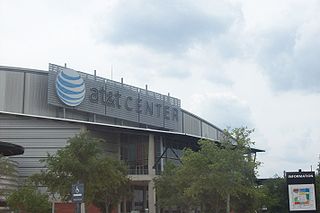
AT&T Center is a multi-purpose indoor arena on the east side of San Antonio, Texas, United States. It is the home of the San Antonio Spurs of the National Basketball Association.

Welton David Becket was an American modern architect who designed many buildings in Los Angeles, California.

A wheelchair ramp is an inclined plane installed in addition to or instead of stairs. Ramps permit wheelchair users, as well as people pushing strollers, carts, or other wheeled objects, to more easily access a building, or navigate between areas of different height. Ramps for accessibility may predate the wheelchair and are found in ancient Greece.
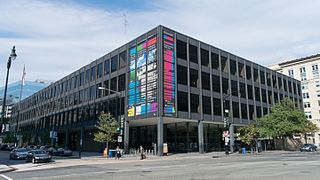
The Martin Luther King Jr. Memorial Library (MLKML) is the central facility of the District of Columbia Public Library (DCPL), it was constructed and named in honor of the American civil rights leader Dr. Martin Luther King Jr. It is located in the 901 G St. NW Downtown, with its main entrance between 9th and 10th St. in the opposite corner of Gallery Place station, and the Smithsonian American Art Museum, it serves also Chinatown, Washington, D.C., Mount Vernon Square and Penn Quarter neighborhoods.

The St. Charles Streetcar Line is a historic streetcar line in New Orleans, Louisiana. Running since 1835, it is the oldest continuously operating streetcar line in the world. It is operated by the New Orleans Regional Transit Authority (RTA). Officially the St. Charles Streetcar line is designated as Route 12, and it runs along its namesake, St. Charles Avenue. It is the busiest route in the RTA system as it is heavily used by local commuters and tourists. On most RTA maps and publications, it is denoted in green, which is also the color of the streetcars on this line.

A wheelchair-accessible van is a vehicle that has been modified by increasing the interior size of the vehicle and equipping it with a means of wheelchair entry, such as a wheelchair ramp or powered lift.
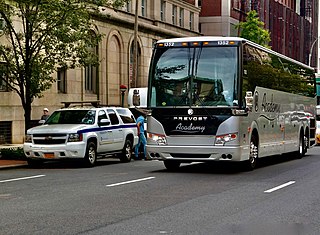
Academy Bus Lines is a bus company in New Jersey providing local bus services in northern New Jersey, line-run services to/from New York City from points in southern and central New Jersey, and contract and charter service in the eastern United States from Boston to Miami. In 2014, Academy acquired Go Buses, which currently operates bus service between Boston and Washington, D.C. and in southern Florida. Academy is the third-largest motorcoach operator in the United States and Canada.
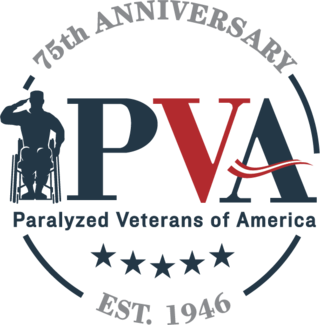
The Paralyzed Veterans of America, a prominent veterans' service organization in the United States, was established in 1946 to serve the needs of disabled veterans. With 33 chapters and 70 National Service Offices across the US and Puerto Rico, the organization is headquartered in the nation's capital, Washington, D.C. In 1946, a group of service members who returned home from World War II with spinal cord injuries established the Paralyzed Veterans of America (PVA). The organization was created to allow its members, veterans of the armed forces living with spinal cord injuries or diseases like multiple sclerosis (MS) and amyotrophic lateral sclerosis (ALS), to live with independence, dignity, and as productive members of society.

Accessible tourism is the ongoing endeavor to ensure tourist destinations, products, and services are accessible to all people, regardless of their physical or intellectual limitations, disabilities or age. It encompasses publicly and privately owned and operated tourist locations. The goal of accessible tourism is to create inclusivity of all including those traveling with children, people with disabilities, as well as seniors. This allows those with access requirements to be able to function as an independent using products following the universal design principle, a variety of services, and different environments.
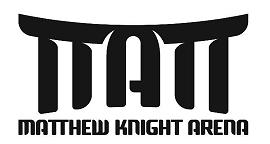
The Matthew Knight Arena (MKA) is a 12,364-seat, multi-purpose arena in Eugene, Oregon, United States. It is home of the University of Oregon Ducks basketball teams, replacing McArthur Court. It is located on the east side of campus at the corner of Franklin Boulevard and Villard Street, a gateway to campus as people arrive from I-5. The arena was originally intended to be ready for the start of the 2010–11 basketball season, but instead opened for the men's basketball game against the USC Trojans on January 13, 2011. It is named for chief donor Phil Knight's son, Matthew Knight, who died aged 34 in a scuba diving accident. The arena cost $227 million and was designed as collaboration between TVA Architects of Portland and Ellerbe Becket of Kansas City, Missouri. Hoffman Construction Company of Portland was the general contractor.

A wheelchair is a chair with wheels, used when walking is difficult or impossible due to illness, injury, problems related to old age, or disability.
In architecture, sightlines are a particularly important consideration in the design of civic structures, such as a stage, arena, or monument. They determine the configuration of such items as theater and stadium design, road junction layout and urban planning. In cities such as London, construction within sightlines is restricted to protect the key views of famous landmarks
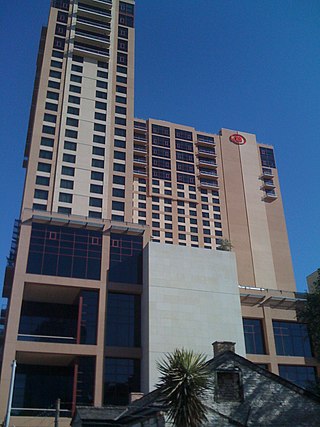
The Hilton Austin Hotel is the third largest hotel in Austin, with 801 rooms. The Hilton Austin is also the sixth tallest hotel and twenty-second tallest building in Austin, Texas at 377 ft (115 m) tall with 31 stories. Designed by Ellerbe Becket Inc and Susman Tisdale Gayle Architects, the building broke ground on July 10, 2001, and topped out officially on January 17, 2003, a span of 1 year, 6 months, and 7 days. In 2018, a $7.5 million overhead walkway was constructed to connect the sixth floor of the hotel with the fourth floor of the Austin Convention Center.

Morgan's Wonderland is an accessibility-focused theme park in San Antonio, Texas founded in 2010. The park was developed by Gordon Hartman, a former homebuilder from San Antonio. Morgan's Wonderland has had over a net million guests since its opening in 2010. The park features several attractions including rides, playgrounds, gardens, a catch-and-release fishing lake, a special-event center, and 575-seat amphitheater. The park's focus on accessibility makes it free for disabled individuals to attend the park.

The physical accessibility of the Metropolitan Transportation Authority (MTA)'s public transit network, serving the New York metropolitan area, is incomplete. Although all buses are wheelchair-accessible in compliance with the Americans with Disabilities Act of 1990 (ADA), much of the MTA's rail system was built before wheelchair access was a requirement under the ADA. This includes the MTA's rapid transit systems, the New York City Subway and Staten Island Railway, and its commuter rail services, the Long Island Rail Road (LIRR) and Metro-North Railroad. Consequently, most stations were not designed to be accessible to people with disabilities, and many MTA facilities lack accessible announcements, signs, tactile components, and other features.

In the United States, reserved spaces are mandated by the Americans with Disabilities Act Accessibility Guidelines.
Michigan Paralyzed Veterans of America v. The University of Michigan was a case filed before the United States District Court for the Eastern District of Michigan Southern Division. The case was brought on behalf of the Michigan Paralyzed Veterans of America (MPVA) against the University of Michigan, alleging that the $226-million renovation of Michigan Stadium violated the Americans with Disabilities Act (ADA) by not providing adequate seating, restrooms, concessions, and parking for disabled fans.
References
- ↑ "Paralyzed Veterans, America v. D.C. Arena, 117 F.3d 579". casetext.com. Archived from the original on July 14, 2019. Retrieved July 14, 2019.
- ↑ "Paralyzed Veterans of America v. Ellerbe Becket Architects United States' Memorandum in Opposition to Defendant's Motion to Dismiss (7/10/96)" (PDF). ADA. Archived (PDF) from the original on October 16, 2020. Retrieved July 14, 2019.
- ↑ "U.S. v. Ellerbe Becket, Inc, 976 F. Supp. 1262". casetext.com. Archived from the original on July 14, 2019. Retrieved July 14, 2019.
- 1 2 Sido, Kevin R. (2006-01-01). Architect and Engineer Liability: Claims Against Design Professionals. Wolters Kluwer. ISBN 978-0-7355-6103-8.
- ↑ Colgate, James (1999-01-01). "If You Build It, Can They Sue? Architects' Liability Under Title III of the ADA". Fordham Law Review. 68 (1): 137.